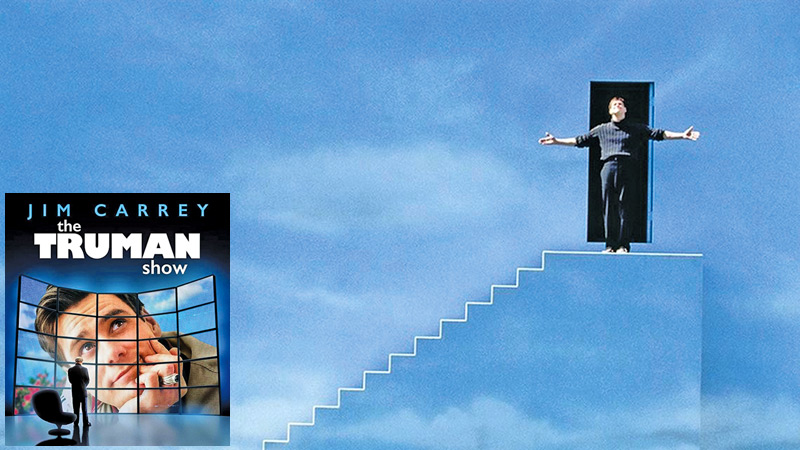“The Truman Show” is a 1998 comedy-drama film directed by Peter Weir and starring Jim Carrey as the titular character, Truman Burbank. The film explores the life of Truman, who unknowingly lives his entire existence in front of hidden cameras in a massive television studio, with every aspect of his life being scripted and controlled.
Plot and Concept:
“The Truman Show” presents a unique and thought-provoking concept, blending elements of comedy and science fiction. The idea of an entire life being a reality TV show without the protagonist’s knowledge was quite innovative at the time of its release. The film delves into the ethical implications of such a setup and raises questions about the nature of reality, free will, and the impact of media on our lives.
Performance:
Jim Carrey’s performance as Truman is a departure from his usual comedic roles. He demonstrates his versatility by delivering a nuanced portrayal of a man discovering the truth about his existence. The supporting cast, including Laura Linney, Ed Harris, and Noah Emmerich, also contributes to the film’s success with their convincing performances.
Direction and Cinematography:
Peter Weir’s direction is commendable, as he skillfully navigates between different tones, seamlessly blending drama, comedy, and satire. The film’s cinematography, by Peter Biziou, captures the artificiality of Truman’s world while also conveying the emotional depth of the story. The use of cameras within the film, both seen and unseen, reinforces the theme of constant surveillance.
Writing:
Andrew Niccol’s screenplay is witty and intelligent. The narrative unfolds in a way that keeps the audience engaged, and the exploration of Truman’s realization and rebellion against his scripted life is both entertaining and thought-provoking.
The film’s script successfully combines humor and philosophical elements, making it accessible to a wide audience.
Themes:
“The Truman Show” explores themes of free will, the impact of media on society, and the search for authenticity in a world filled with artificiality. The film raises important questions about the ethical boundaries of entertainment and the consequences of manipulating someone’s life for the sake of entertainment.
Psychoanalytic Interpretation:
An essay in the International Journal of Psychoanalysis interprets Truman as a prototypical adolescent, feeling trapped in a familial and social world. Truman’s journey symbolizes a transition to maturity, leaving behind his child-self and becoming a “True-man.”
Connections to Utopia:
Parallels with Thomas More’s “Utopia” emerge, with Truman unknowingly confined to a utopian-like world. The film explores the manipulation of Truman’s reality to maintain a facade of the “American Dream” of the 1950s, reflecting societal ideals of the time.
Release and Reception:
Originally slated for August 8, 1997, the release date was pushed to November 14, 1997, and eventually to the summer of 1998. The film received critical acclaim, holding a 95% approval rating on Rotten Tomatoes and a score of 90 on Metacritic, indicating “universal acclaim.” Audiences polled by CinemaScore gave it a respectable “B” grade.
Home Media and Legacy:
“The Truman Show” was released on VHS in 1999, followed by a DVD release in the same year. A “Special Edition” re-release came in 2005, and a Blu-ray version was released in 2008. In 2023, an Ultra HD Blu-ray marked the film’s 25th anniversary. The movie’s enduring impact is evident in its inclusion in the 2022 Cannes Film Festival’s official poster, paying homage to its final scene and its reflection of Plato’s cave.
Critical Acclaim and Enduring Legacy:
Critics praised the film’s balance of comedy and drama, with Roger Ebert giving it a perfect four-star score and likening it to “Forrest Gump.”
Entertainment Weekly named Truman one of the “100 Greatest Characters of the Last 20 Years” in 2010. Its exploration of reality, media manipulation, and individual autonomy continues to resonate, making “The Truman Show” a timeless cinematic gem.
In conclusion, “The Truman Show” stands as a testament to the collaborative efforts of its creative team, its ability to blend genres seamlessly, and its enduring relevance in exploring profound philosophical themes. Two and a half decades since its release, Truman’s journey remains a captivating exploration of the boundaries between reality and fiction.
Impact:
“The Truman Show” has left a lasting impact on popular culture and has been praised for its originality and thematic depth. It remains relevant in discussions about reality television, surveillance, and the blurring lines between entertainment and reality.
“The Truman Show” is a captivating and thought-provoking film that successfully combines comedy, drama, and science fiction. Its unique concept, strong performances, and exploration of profound themes make it a memorable and influential piece of cinema.









